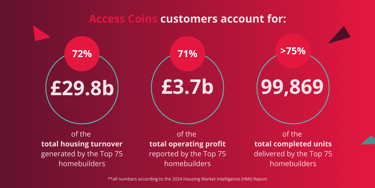Blog - Page 1

New Partnership: Access Construction & Copay Collaborate to Unlock Construction Cashflow Liquidity
Read Article on New Partnership: Access Construction & Copay Collaborate to Unlock Construction Cashflow Liquidity
Access Construction Wins Big at the Construction Computing Awards 2025
Read Article on Access Construction Wins Big at the Construction Computing Awards 2025
Access Coins Wins Gold at the National Building and Construction Awards 2025
Read Article on Access Coins Wins Gold at the National Building and Construction Awards 2025
Access Construction Celebrates Multiple Award Nominations This Autumn
Read Article on Access Construction Celebrates Multiple Award Nominations This Autumn
Reverse VAT Charge Explained
Read Article on Reverse VAT Charge Explained
Access Construction Partners with ancora Software, Inc to automate Accounts Payable information
Read Article on Access Construction Partners with ancora Software, Inc to automate Accounts Payable information
Access Construction Partners with Local Supply Chain to Revolutionise Supply Chain Management
Read Article on Access Construction Partners with Local Supply Chain to Revolutionise Supply Chain Management
Managing Construction Cost Control in Volatile Times
Read Article on Managing Construction Cost Control in Volatile Times
Powering Progress: Access Coins’ Role in the Success of the UK’s Leading Housebuilders
Read Article on Powering Progress: Access Coins’ Role in the Success of the UK’s Leading Housebuilders
Exciting Partnership Announcement: Access Coins and Payapps Integration to Transform Construction Industry Payments
Read Article on Exciting Partnership Announcement: Access Coins and Payapps Integration to Transform Construction Industry Payments
Access Coins Wins Product of the Year at Construction Computing Awards
Read Article on Access Coins Wins Product of the Year at Construction Computing Awards
How Legacy ERP Systems are Holding Construction Back
Read Article on How Legacy ERP Systems are Holding Construction Back
Women In Construction - How to Appeal to the Sector's Biggest Untapped Demographic
Read Article on Women In Construction - How to Appeal to the Sector's Biggest Untapped Demographic
Most Innovative Partnership: Access ConQuest and Wates Construction Nominated at the Building Innovation Awards
Read Article on Most Innovative Partnership: Access ConQuest and Wates Construction Nominated at the Building Innovation Awards
AssetTagz partners with Access
Read Article on AssetTagz partners with Access
Questions to Ask Vendors When Selecting Construction ERP Software
Read Article on Questions to Ask Vendors When Selecting Construction ERP Software
5 Challenges in the Tendering Process in Construction (and How to Fix Them)
Read Article on 5 Challenges in the Tendering Process in Construction (and How to Fix Them)
AI in Construction: How Big Data, ERP and Automation are Transforming the Sector
Read Article on AI in Construction: How Big Data, ERP and Automation are Transforming the Sector
How ERP Systems Empower Home builders in a Challenging Market
Read Article on How ERP Systems Empower Home builders in a Challenging Market
Access Construction Launches Access ConQuest 7 Construction Estimating Software
Read Article on Access Construction Launches Access ConQuest 7 Construction Estimating Software
Low Carbon Building Materials in Construction
Read Article on Low Carbon Building Materials in Construction
What is ‘Deconstruction’ in Construction? How ERP Can Drive Deconstruction and Sustainability
Read Article on What is ‘Deconstruction’ in Construction? How ERP Can Drive Deconstruction and Sustainability
Access Construction Wins Double at Construction Computing Awards
Read Article on Access Construction Wins Double at Construction Computing Awards
Access Construction Nominated for Nine Construction Computing Awards
Read Article on Access Construction Nominated for Nine Construction Computing AwardsNet Zero 2050 - Will ‘Whole Life’ Carbon Assessments Help or Hinder The UK Construction Industry?
Read Article on Net Zero 2050 - Will ‘Whole Life’ Carbon Assessments Help or Hinder The UK Construction Industry?
The benefits of collaboration in construction (and how to achieve it)
Read Article on The benefits of collaboration in construction (and how to achieve it)
A Framework for Data Transparency in Construction
Read Article on A Framework for Data Transparency in Construction
4 Steps to overcome resistance to new construction software
Read Article on 4 Steps to overcome resistance to new construction software
How to Make Construction Estimates More Accurate In Six Steps
Read Article on How to Make Construction Estimates More Accurate In Six Steps

 AU & NZ
AU & NZ
 SG
SG
 MY
MY
 US
US
 IE
IE